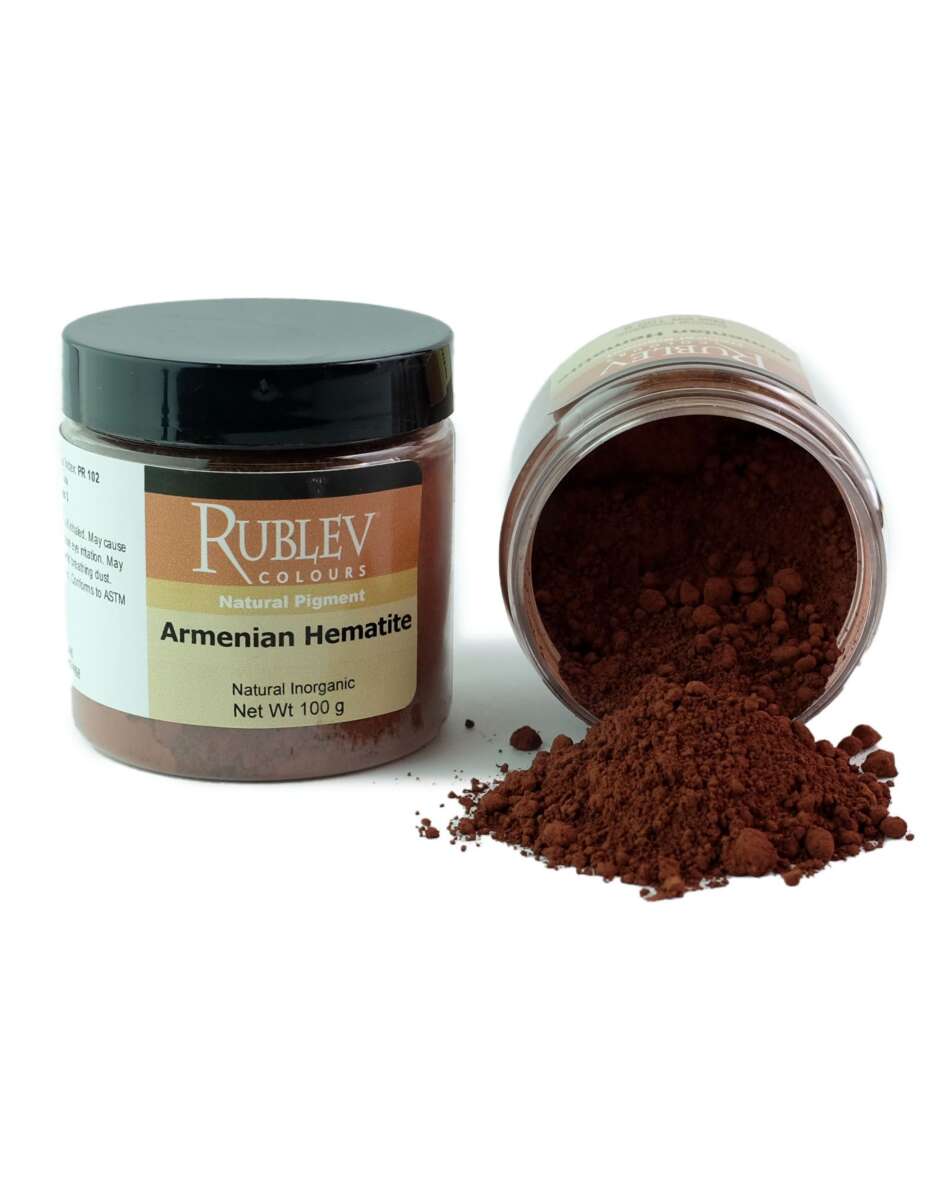Armenian Hematite Pigment
Armenian Hematite is a natural red iron oxide of a cherry red hue. This hematite is from iron ore deposits in the Lori province of Armenia. It is a lustrous pigment of considerable tinting strength and opacity.
Armenian Hematite is a natural red iron oxide of a cherry red hue. This hematite is from iron ore deposits in the Lori province of Armenia.
Natural red iron oxides are opaque, absolutely permanent and have excellent covering power. They are strong absorbers of ultraviolet light. The best bluish shades are called Indian red; the yellowish shades, light red, English red, and Venetian red. Formerly there was much confusion in the nomenclature of the red oxides; the terms given in this list are those specified in the ASTM Standard.
Origin and History
Natural red iron oxide is based on the mineral ore hematite. The word hematite comes from the Greek word hema, meaning blood and was given the name "bloodstone" in ancient Greece (Theofrastus, c. 325 B.C.), implying that the mineral is blood red in color. Hematite is an important ore of iron and its blood red color in the powdered form lends itself well as a pigment. Hematite is among the oldest pigments known to humankind and has been used by every major civilization.
Source
In nature hematite rarely occurs as crystals but usually as nodules or earthen masses. The color of the crystalline form varies from steel-gray to black, while crypto-crystalline hematite is dull red to bright red. This common mineral is found in deposits of the most diverse types. There are several varieties of hematite, two of which are suitable for use as pigments: oolitic hematite, which is a friable earth composed of small rounded grains of dark red color that are lustrous and greasy to the touch; and hematite rose, a fine-crystalline and crypto-crystalline form of hematite of red color, which are usually encountered in friable earthen masses or reniform aggregates of bladed crystals in a circular arrangement giving the appearance of a rose. Red iron oxides (hematite) are found around the world and have been used as pigments since prehistory.
Permanence and Compatibility
Pigments made from the mineral hematite are dependable in mixtures with all other permanent pigments, and are considered to be permanent with considerable tinting strength and opacity. They do not react with solvents, and are indifferent to alkalis, but are partially soluble in acids. Zinc white and hematite yield excellent flesh tints.
Oil Absorption and Grinding
Natural red iron oxides absorb a moderate amount of oil. The oil absorption ratio is 18 parts by weight of pigment to 100 parts by weight of oil. If the measurement were grams, red iron oxide would require 18 grams of pigment to grind 100 grams of linseed oil to form a stiff paste. It forms an average drying oil paint, and a hard, fairly flexible film.
Toxicity
Natural red iron oxide is not considered to be toxic, but care should be used in handling the dry powder pigment to avoid inhaling the dust.
| Pigment Information | |
| Color: | Red |
| Colour Index: | Pigment Red 102 (77491) |
| Chemical Name: | Iron Oxide |
| Chemical Formula: | α-Fe2O3 |
| Chemical Composition | |
| SiO2: | 58.67% |
| Al2O3: | 17.06% |
| Fe2O3: | 11.22% |
| MgO: | 0.12% |
| CaO: | 0.59% |
| ASTM Lightfastness Rating | |
| Acrylic: | I |
| Oil: | I |
| Watercolor: | I |
| Properties | |
| Bulk Density: | 1.16 g/cm3 |
| Oil Absorption: | 18 g/100 g |
| Particle Size: | sub-0 to 15 microns: 80-85% 16 to 29 microns: 15-20% 30 microns and above: 0.1% |
| Residual (Mesh 325): | <0.1% |
| pH: | 7.8 |
| Thermal Color Stability: | <350 °C |
| SKU | 453-10 |
|---|---|
| Brand | Rublev Colours |
| Vendor | Rublev Colours |
| Processing Time | Usually ships the next business day. |
| Color | Red |
| Pigment Type | Inorganic, Earth, Natural |
Health and Safety
There are no acute or known chronic health hazards with the anticipated use of this product. Protect yourself against potentially known hazards by keeping it out of your body. Do this by avoiding ingestion, excessive skin contact and inhalation of dusts. Conforms to ASTM D4236.


